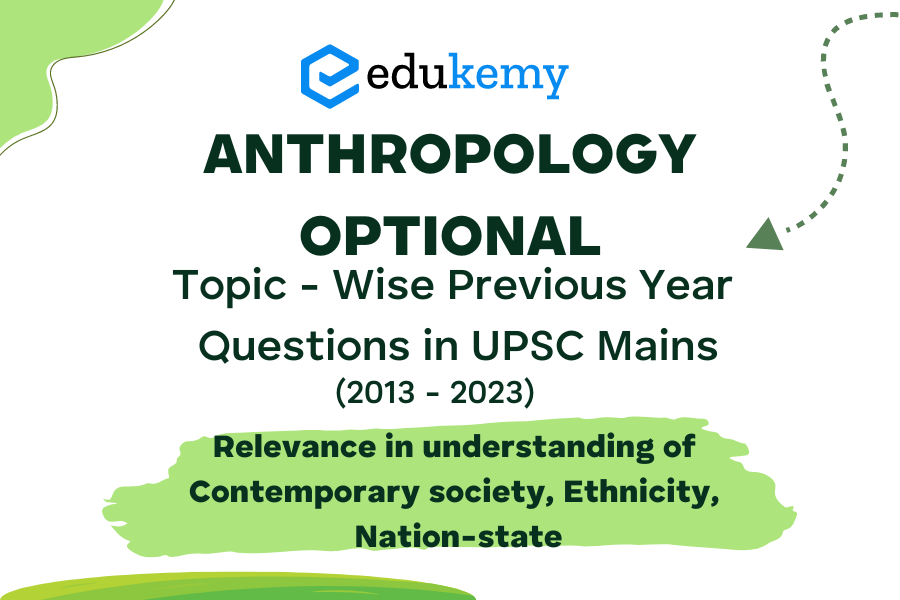
In the vast realm of UPSC Mains preparation, the choice of an optional subject plays a pivotal role in shaping a candidate’s success trajectory. Among the myriad options available, Anthropology stands out as a subject that not only delves into the historical and cultural aspects of human societies but also provides profound insights into contemporary issues. This blog aims to shed light on the significance of Anthropology optional topic-wise previous year questions in the UPSC Mains examination, focusing specifically on the years 2013-2023. By analyzing these questions, aspirants can gain a comprehensive understanding of how Anthropology serves as a lens to interpret and comprehend the complexities of contemporary society, ethnicity, and the formation of nation-states.
The relevance of revisiting the previous year’s questions lies in their ability to serve as invaluable tools for exam preparation. Exploring the evolution of themes and topics over the years helps candidates anticipate the diverse range of questions that may be posed in the upcoming examinations. As we navigate through the questions from 2013 to 2023, we will unravel the dynamic nature of Anthropology as an optional subject and its applicability in deciphering the nuances of modern societal structures, ethnic identities, and the ever-evolving concept of the nation-state. Join us on this insightful journey, as we delve into the past to glean insights that will undoubtedly shape the future success of UPSC Anthropology aspirants.
Contents
- 1 Relevance in understanding of Contemporary society, Ethnicity, Nation-state – Previous Year Questions (UPSC CSE Mains Anthropology Optional)
- 2 Frequently Asked Questions (FAQs)
- 2.1 1. Why is the study of Anthropology, particularly its focus on contemporary society, ethnicity, and nation-state, relevant in today’s world?
- 2.2 2. How does Anthropology contribute to our understanding of ethnicity, and why is this understanding significant in the current global context?
- 2.3 3. Can studying Anthropology aid in comprehending the complexities of nation-state formation and governance?
- 2.4 4. How do previous year questions in Anthropology optional topics assist in preparing for examinations?
- 2.5 5. In what ways does the study of Anthropology impact our perception of identity and citizenship in today’s diverse societies?
- 3 In case you still have your doubts, contact us on 9811333901.
Relevance in understanding of Contemporary society, Ethnicity, Nation-state – Previous Year Questions (UPSC CSE Mains Anthropology Optional)
1. Write a note on Nation building processes in new states (1993)
2. Write a note on Nation State (2002)
3. What is ethnicity? Does ethnicity add to conflicts and tensions in the society? Illustrate. (2002)
4. Write a note on Ethnic Conflict (2004)
5. Explain Fredrik Barth’s concept of ethnic boundaries. Explain its distinction from cultural content. (2004)
6. Discuss the relationship of ethnicity and nation-state. · (2005)
7. Explain the impact of discovery of iron technology on contemporary society. (2018)
Frequently Asked Questions (FAQs)
1. Why is the study of Anthropology, particularly its focus on contemporary society, ethnicity, and nation-state, relevant in today’s world?
A: Understanding contemporary society is crucial for effective policymaking and social development. Anthropology provides a unique perspective, delving into the intricacies of cultural dynamics and societal structures, offering insights that are essential for addressing modern challenges.
2. How does Anthropology contribute to our understanding of ethnicity, and why is this understanding significant in the current global context?
A: Anthropology explores the complexities of ethnicity by examining cultural, historical, and social dimensions. In an era marked by increased diversity and globalization, a nuanced understanding of ethnicity is vital for fostering inclusivity and promoting social cohesion on a global scale.
3. Can studying Anthropology aid in comprehending the complexities of nation-state formation and governance?
A: Absolutely. Anthropology provides a lens through which one can analyze the historical processes and cultural factors that contribute to the formation and functioning of nation-states. This knowledge is essential for policymakers and leaders in navigating the challenges of contemporary governance.
4. How do previous year questions in Anthropology optional topics assist in preparing for examinations?
A: Reviewing previous year questions is a strategic approach to exam preparation. It helps aspirants understand the evolving trends in exam patterns, focus areas, and question types. This insight is invaluable for tailoring study plans and ensuring a comprehensive coverage of Anthropology syllabus.
5. In what ways does the study of Anthropology impact our perception of identity and citizenship in today’s diverse societies?
A: Anthropology sheds light on the construction of identity, be it individual or collective, and its relation to citizenship. As societies become more multicultural, Anthropology equips us with the tools to navigate the complexities of identity politics, fostering a more inclusive and tolerant approach towards citizenship.
In case you still have your doubts, contact us on 9811333901.
For UPSC Prelims Resources, Click here
For Daily Updates and Study Material:
Join our Telegram Channel – Edukemy for IAS
- 1. Learn through Videos – here
- 2. Be Exam Ready by Practicing Daily MCQs – here
- 3. Daily Newsletter – Get all your Current Affairs Covered – here
- 4. Mains Answer Writing Practice – here

